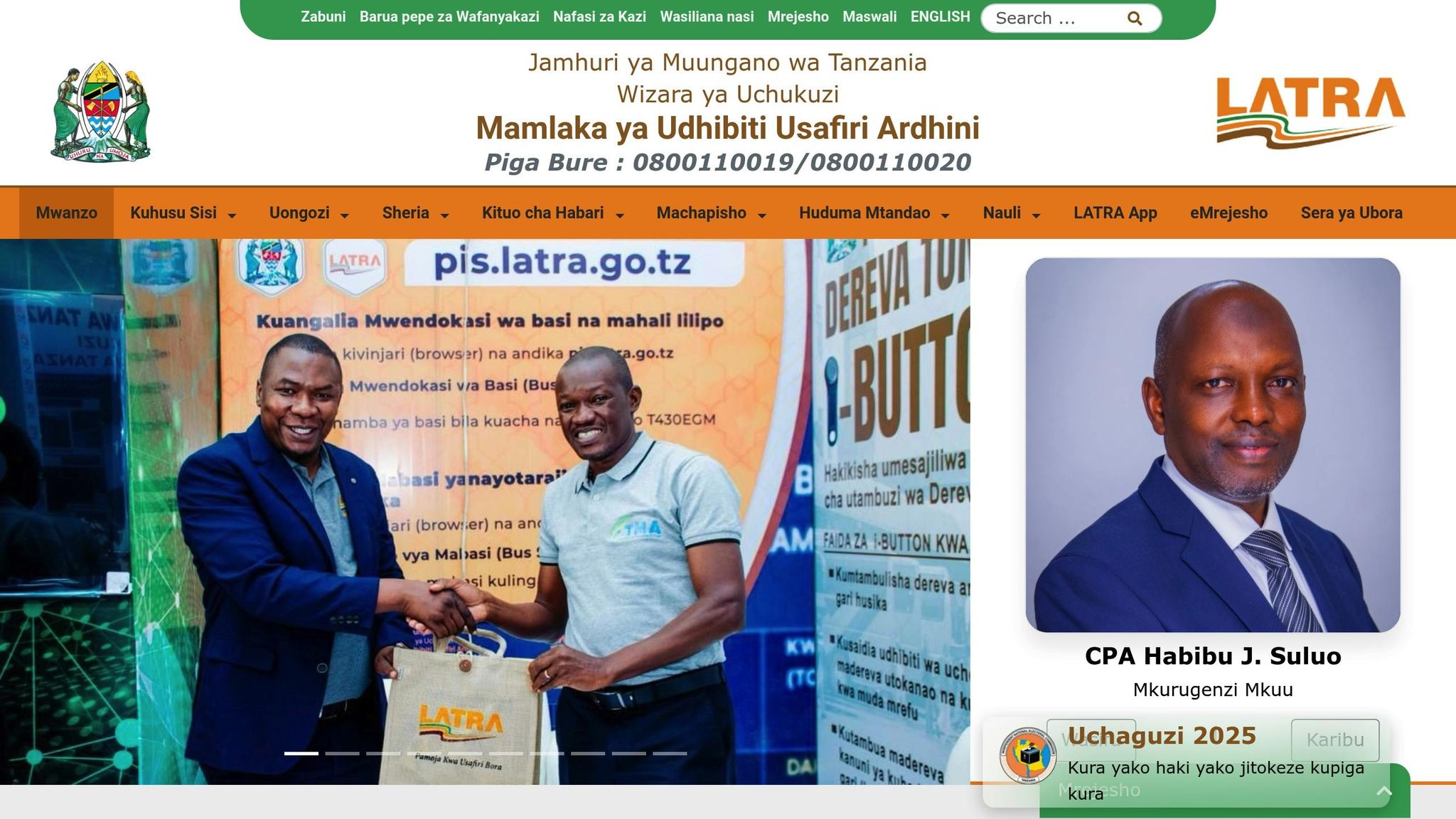Dar es Salaam’s ride-sharing market is regulated by the Land Transport Regulatory Authority (LATRA). Here’s what you need to know:
- Minimum Fare: TZS 3,000 (approx. $1.25).
- Per-Kilometer Rate: TZS 900 (about $0.38).
- Platform Commission Cap: 15% for drivers.
- Driver Requirements: Public Service Vehicle (PSV) license, background checks, and vehicle compliance.
- Vehicle Criteria: 2003 or newer, under 1,300cc, 4-door sedan, commercial insurance, and City Sticker.
- Platform Licensing: Requires business and transport licenses, compliance with LATRA standards, and documentation like tax certificates and audited financials.
LATRA enforces strict rules to ensure fair pricing, safety, and service quality. Non-compliance can lead to penalties, including license revocation. Staying informed and meeting these standards is key for both platforms and drivers.
Madereva wa Uber wagoma Dar es Salaam
Legal Framework and Government Agencies
Tanzania’s ride-sharing industry operates within a well-defined set of regulations. For platform operators, drivers, and investors, understanding the key roles of government agencies is a must.
LATRA‘s Role in Oversight

The Land Transport Regulatory Authority (LATRA) plays a central role in regulating the sector. It handles licensing and registration for platforms and drivers, oversees fare practices, conducts safety inspections, and ensures compliance with regulations. LATRA also has the authority to suspend or revoke licenses when necessary.
Key Regulations and Requirements
Ride-sharing services in Tanzania must follow rules that cover registration, fare structures, commission caps, safety measures, and driver qualifications. These regulations aim to align digital ride-sharing services with the standards expected of traditional taxis while addressing the unique challenges of the market. Operators are required to obtain the necessary licenses to legally provide their services.
Business and Transport Licenses
Ride-sharing operators need two distinct licenses to operate:
- Business License: Issued by BRELA, this license allows commercial operations. To obtain it, operators must provide a Taxpayer Identification Number (TIN) and a local business permit.
- Transport License (PSV License): Issued by LATRA, this license permits passenger transport services and ensures compliance with safety and service standards.
Platforms must hold both licenses, while individual drivers are required to have a transport license to operate legally.
License Requirements for Platforms and Drivers
Licenses play a critical role in regulating Dar es Salaam’s ride-sharing market. Both platforms and drivers must meet specific requirements to operate legally.
Platform Registration and Rules
Platforms undergo a thorough three-step licensing process with LATRA, which evaluates their business structure, compliance management, and technical capabilities.
In the technical stage, mobile applications must align with LATRA’s standards. These include features for seamless customer and driver interactions, robust safety measures, efficient trip management, and API integration to enable real-time reporting on trips, driver activities, and fare collection.
During the online application phase, platforms must submit several key documents, including audited financial statements, tax certificates, and proof of local registration. The Tanzania Ride Hailing Service Operator License Guide, issued by CPA Habibu J.S. Suluo, LATRA’s Director General, on November 19, 2022, provides an in-depth explanation of these requirements.
Once platforms meet these conditions, the focus shifts to the specific licensing protocols for drivers.
Driver and Vehicle Licenses
While platform licensing ensures operational compliance, individual drivers face their own set of requirements. Drivers must secure a Public Service Vehicle (PSV) license from LATRA, which includes background checks and verification of driving experience.
Vehicles used for ride-sharing must meet strict criteria. Eligible vehicles must:
- Be from 2003 or newer.
- Have an engine capacity under 1,300cc.
- Be a 4-door sedan with seating for at least five passengers.
- Be free of cosmetic damage and equipped with functioning windows and air conditioning [3].
Additionally, vehicles must have a commercially registered motor vehicle registration card, motor vehicle insurance for commercial use, and display a City Sticker (Stika ya Jiji) to identify them as part of a ride-sharing service [3].
Certain vehicle types are excluded, such as full-sized vans, trucks, taxi cabs, government cars, marked vehicles, and salvaged or rebuilt vehicles [3]. Popular eligible models include the Volkswagen Polo, Toyota Camry, Ractis, Yaris, Vitz, Daihatsu Terios, Suzuki Swift, Nissan March, and Mazda Axela [3].
Motorcycle Taxis and 3-Wheelers
Motorcycle taxis and three-wheelers, like bodabodas and bajajis, follow unique regulations aimed at ensuring safety. Operators must display registration numbers on their uniforms, allowing authorities to monitor their activities effectively.
Safety equipment is non-negotiable for these operators. Riders are required to use helmets, wear high-visibility vests, and carry fire extinguishers. The licensing process for these vehicles includes inspections and compliance checks to confirm they meet essential safety and roadworthiness standards before being approved for use.
These measures collectively aim to maintain a safe and reliable ride-sharing ecosystem.
Pricing Rules and Operating Standards
LATRA’s regulatory framework ensures that ride-sharing services in Dar es Salaam follow strict pricing rules and operational standards. These measures aim to standardize fares, enhance service quality, and prioritize safety for both passengers and drivers.
Approved Fare Structure
Under LATRA Order No. LATRA/01/2022, ride-sharing services in Dar es Salaam must adhere to a fixed fare structure. This structure includes three key components:
- Minimum Fare: TZS 3,000.00 (about $1.18) serves as the base charge.
- Distance-Based Charges: TZS 900.00 (around $0.35) per kilometer accounts for the travel distance.
- Time-Based Charges: TZS 100.00 (approximately $0.04) per minute compensates for travel time.
These standardized rates are designed to ensure fair pricing and prevent manipulation, providing passengers with cost transparency. Beyond fare regulation, LATRA also enforces strict standards for service quality and safety.
Service Quality and Safety Standards
LATRA prioritizes consistent and professional service across all ride-sharing platforms by implementing comprehensive quality and safety standards.
The authority oversees land transport safety, including vehicle operation and maintenance. Regular vehicle inspections are mandatory to protect both passengers and drivers. Additionally, LATRA requires all commercial transportation drivers, including those in ride-hailing services, to be certified. This certification process ensures that drivers meet professional and safety benchmarks.
In May 2025, LATRA introduced enhanced requirements for tourist vehicle drivers. These updates include specialized exams and new registration protocols aimed at boosting safety, professionalism, and service standards. Tourist vehicles must also display "Tour Services" labels on their side panels and are restricted to tourist transportation only.
To streamline driver verification, LATRA has implemented a national digital driver database. By May 2025, over 4,500 drivers were registered in this system, categorized by vehicle type and service nature. This database allows for efficient monitoring of certified drivers and ensures compliance with LATRA’s safety and quality standards.
Consumer protection is another cornerstone of LATRA’s regulations. The authority enforces guidelines on driver conduct, vehicle maintenance, passenger safety measures, and complaint resolution processes, ensuring that platforms consistently meet these expectations.
sbb-itb-d9186c2
Compliance and Rule Enforcement
LATRA takes a firm stance against non-compliance, holding both platforms and drivers accountable. According to a study, 88.2% of respondents believe LATRA enforces its rules strictly. One of its primary actions includes canceling public transport permits and licenses for those who fail to meet regulatory standards. This demonstrates LATRA’s dedication to ensuring that rules are followed.
This rigorous approach sets the stage for the compliance checklist outlined in the following section.
Compliance Checklist
Here’s a straightforward checklist to help platforms and drivers stay aligned with LATRA’s regulations.
Platform Compliance Steps
- Register your platform: Submit all necessary documentation as outlined by LATRA guidelines.
- Stay informed: Keep up with LATRA updates to ensure your operations remain compliant.
- Review operations regularly: Periodically assess your processes to ensure they meet LATRA’s standards.
Driver and Vehicle Owner Requirements
- License and vehicle checks: Confirm that all drivers hold valid licenses and that vehicles meet LATRA’s criteria.
- Keep documentation current: Ensure permits and other essential paperwork are always up to date, following LATRA’s requirements.
Conclusion: Following Ride-Sharing Rules in Dar es Salaam
Navigating LATRA’s ride-sharing rules becomes much easier when you understand the requirements and make an effort to stay ahead of them. By doing so, drivers and platforms alike can ensure smoother operations and enhanced safety for everyone involved.
In July 2024, an industry executive pointed out that successful drivers often rely on "Driver WhatsApp Groups for Intel" to exchange real-time updates about high-demand areas, app features, or upcoming events. This kind of communication helps drivers stay informed, avoid penalties, and reduce service interruptions.
For ride-sharing platforms, meeting LATRA’s regulatory expectations means conducting regular checks on documentation, keeping up with regulation updates, and ensuring all processes align with established guidelines. On the other hand, drivers need to maintain proper licenses and vehicle documentation at all times.
Staying compliant not only reduces risks but also improves service quality, fostering trust among passengers and regulators. Whether through official support channels or driver networks, staying informed ensures you’re always operating within the rules. Taking a proactive approach today sets the foundation for long-term success in Dar es Salaam’s ride-sharing market [3].
FAQs
What are the requirements for a vehicle to qualify for ride-sharing in Dar es Salaam?
To participate in ride-sharing services in Dar es Salaam, vehicles must adhere to these requirements:
- Model Year: The car should be from 2003 or newer.
- Engine Size: Must have an engine capacity of less than 1300cc.
- Condition: The vehicle needs to be in good condition, free from cosmetic damage, and equipped with functional windows and air conditioning.
- Registration: It must be commercially registered and come with a valid motor vehicle registration card, insurance, and a city sticker.
Additionally, only 4-door sedans are allowed. Vehicles such as vans, trucks, taxis, government-owned cars, or salvaged vehicles are not eligible. Meeting these standards is crucial to comply with local ride-sharing regulations.
How does LATRA enforce ride-sharing regulations, and what happens if drivers or platforms don’t comply?
How LATRA Enforces Ride-Sharing Regulations
LATRA takes ride-sharing compliance seriously, keeping a close eye on operators and imposing tough penalties for any violations. These penalties can range from fines and license suspensions to outright revocation of licenses or restrictions on transport operations for drivers or platforms that fail to follow the rules.
For those not meeting the required standards, the penalties are no small matter. Fines start at $400, and in more severe cases, licenses can be suspended or permanently revoked. These actions are designed to prioritize safety, ensure proper licensing, and uphold operational standards. Ignoring these regulations can result in hefty legal and business consequences for ride-sharing operators in Dar es Salaam.
What does a ride-sharing platform need to do to operate legally in Dar es Salaam?
To legally operate in Dar es Salaam, ride-sharing platforms must secure a ride-hailing service operator license from the Land Transport Regulatory Authority (LATRA). This involves meeting several requirements, including having a fully functional app, ensuring proper technical API integration, and submitting essential documents like a business plan, financial statements, and proof of tax compliance.
In addition to this, operators must obtain a public service vehicle (PSV) license, ensure all vehicles adhere to safety standards, and acquire a business license through the Tanzanian Business Registration and Licensing Agency. These steps are crucial for complying with local laws and running the platform legally.
Related posts
- Traffic Laws in Tanzania: Key Rules Explained
- Car prices in Dar es Salaam
- Car registration costs in Tanzania
- What to Check Before Buying a Second-Hand Car in Tanzania




